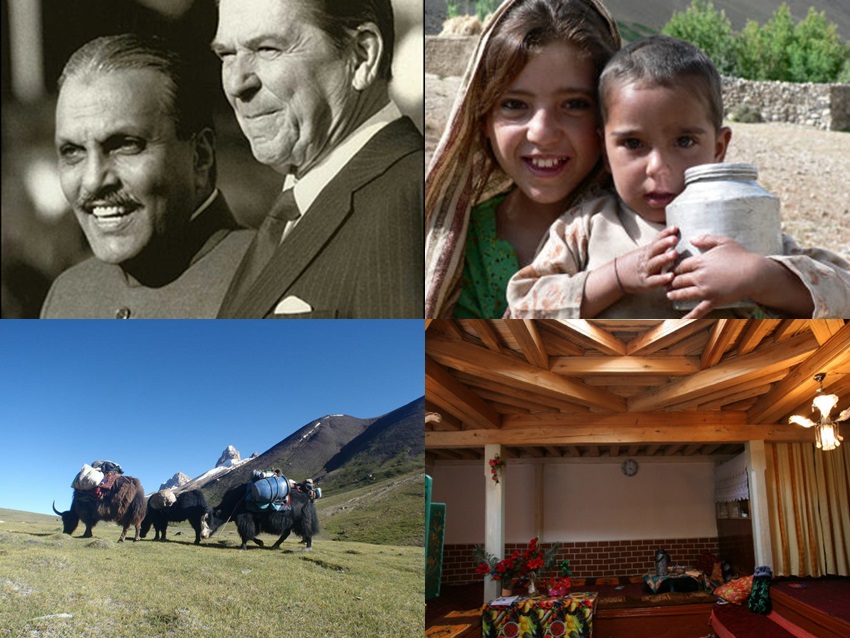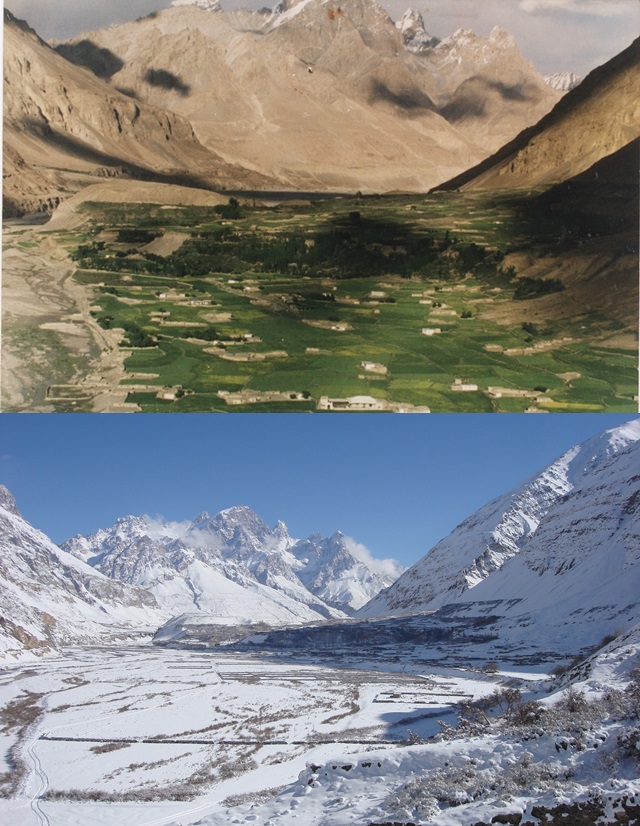Tales from the North: How Shimshal got its Road

I spent a week in Shimshal, the highest elevation year-round village in Pakistan at just over 13,000 feet. My objective was to set up a performance monitoring and reporting plan for a WWF environmental education project. I did two hikes, one to the Yazghail Glacier and another in the direction of the Shimshal Pass, entry point to the Pamir mountain range.
I also heard the unique and uplifting story of how Shimshal, which had for most its history been disconnected from the rest of the world by three days of arduous trekking across craggy rocks and precipitous ravines, finally came to have its own road that connects to the Karakoram Highway (KKH) between Passu and Sost, Sost being the Pakistani immigration and customs checkpoint for the Chinese border. I would like to share this story with you.
In September 1984 a military helicopter lands in an empty potato field in Shimshal. The village had harvested its crop of sugarcane and potatoes just weeks earlier. With nothing to hold it down, a thick wall of dust is driven up from the ground and sent flying in all directions by the rapidly spinning rotors. The local boy scouts troupe shields their faces with their arms as best they can. If anything it adds to their excitement at welcoming to their village the most powerful person they will probably ever lay eyes on, and their fear. Ninety percent of those present have never seen a helicopter before and all are in awe. The powerful sandstorm foreshadows the arrival of the powerful man sitting inside. When God finally revealed himself to Moses, His glorious visage was accompanied by such blinding light that Moses had to shield his eyes and look away, and so it was for the Shimshalis, only instead of light, fast moving airborne dust particles were doing the blinding today.
The landing skids touch ground and the rotors begin decelerating, sounding like a drawn out French ambulance siren speeding away, and out steps President Zia-ul-Haq, the all-powerful military ruler of Pakistan since 1977, when he deposed, imprisoned and later executed by hanging, his predecessor, the democratically elected civilian, Zulfikar Ali Bhutto. After assuming power, Zia worked tirelessly towards changing the culture and identity of Pakistan all the way up to his death in 1988 when his body was pulverized into a thousand pieces and set alight in the desert near Bahawalpur by 20,000 liters of aviation fuel. Some of those charred pieces are buried a short walk from my house in Arlington National Cemetery, but how a portion of a despotic Pakistani general’s remains got into America’s most hallowed burial ground is another story. I can recommend the darkly humorous novel A Case of Exploding Mangoes by Mohammed Hanif if you want to read that story.
The changes Zia made are still here with us today. Pakistan is a more intolerant and divided country because of him. But he also played the most instrumental role after the mujahedeen themselves in defeating the Soviet Union in Afghanistan, a key catalyst to the collapse of that almost seventy year old communist experiment in 1991, splitting it into 16 independent republics. Because of this, the administration of Ronald Reagan loved Zia.

Clockwise from top left – Zia-ul-Haq with Ronald Reagan, A Shimshali girl with her little brother (almost as cute as Zia with The Gipper), Yak being used as porters, Living room in a Shimshali guesthouse
Anyway, back to the story. Zia steps out of his helicopter and after taking one look at the boy scouts there to receive him, turns to his personal security detail and tells them to stay with the chopper, saying something to the effect of “These boys are all the protection I need”, and flashing the scouts a broad smile. This off course thrills the scouts and makes quite an impression on the entire village. I can tell you at least one scout remains in awe of Zia to this day since the majority of this story was narrated to me by him.
The scouts escort the general a short distance to the village leaders who reverently shake his hand, then with a slight bow hold their hand over their heart, signifying deep respect. Zia smoothly transitions into some generic bullshit all politicians employ when meeting the common masses, about how they’re the real salt of the earth folks who make their country great through hard work and sacrifice. After this he asks what he can do for them, and this is the moment the Shimshalis were waiting for and had prepared for.
They pull down their shirts from the neck so the lacerations and scars on their shoulders are visible to their president. They tell him of their hardships living so far from civilization, of how to bring essential items like medicine to the village they must trek three days each way across craggy rocks and precipitous ravines carrying jute sacks on their backs with nothing but ordinary rope, rope that cuts deeper and deeper each hour, leaving their shoulders bruised and bloody. They tell him how every young person who has appendicitis dies because they cannot get him or her to a doctor in time. Zia nods understandingly to everything they have to say and when they’re done he says “That does sound like a very hard life but what can I possibly do about it?”
“Build us a road” is the unanimous reply.
Zia turns to his number two and asks “How many households in this village”. “One hundred and thirty” he replies. “How much would building them a road cost?”. “Around 2 crore rupees” the number two replies ($870,000 in 1984 dollars). At this Zia shakes his head and turning to the village elders makes an incredible offer, “That is too much money for the federal government to spend on a village as small as yours, but what I can do is give you good agricultural land in Sindh (The Southernmost province of Pakistan) and move your village there. This will cost less money and you’ll be out of this godforsaken cold to boot!”. This offer shocks the Shimshalis. Nothing of its kind had ever been contemplated, and yet they could not even entertain it. This was their forefathers’ land and they could never leave it. They declined. Zia’s chopper took off, the visit was over, their hopes were dashed, and they returned to their harsh life, slightly more depressed than before.
Some time passed (somewhere between a few weeks and eight months) and then one night at a big village celebration, most probably a wedding, spirits got dangerously high, the kind of high that makes people say incredibly silly and hopeful things. A few of the men, perhaps further buoyed by some cheap booze from Hunza or China, decided they could build the road themselves. One of them loudly declared to everyone present, which was the entire village, “Who needs the government? We’re strong and intelligent people! We’ll build the road ourselves!” to which everyone cheered excitedly. Spirits rose even further, past the redline they were already at, which may not sound like a bad thing, but they were also accompanied by the expectation that a road would be built and that the guy who announced it would put the plan together. As this dawned on him and his recently merry band of brothers, they all panicked but especially him. What was he to do? He had publicly promised the impossible in front of the entire village!
Pretending he never meant it to be taken seriously, he tried to backtrack. He was trying desperately to hide his embarrassment, but one old grandmotherly type lady wasn’t having any of it. She showered him and the men around him with abuses “You’re all useless, lazy, ball-scratching good-for-nothings! We need a road and if you’re not going to build it, I’ll build it by myself!”. It seemed the shaming was complete, but wait! She wasn’t done! Turning away from the now downcast pod of “useless ball-scratchers” and facing the whole village, the old lady announced that she had a shovel and she was going to start building the road tomorrow morning! One of her friends, another grandmother type, chimed in “And I have a pickaxe! I’ll join you tomorrow morning and we’ll build a road together without these ball-less oafs!”. It did not occur to anyone that a ball-less ball-scratcher was an obvious contradiction, you can only be one or the other at any given point in time, but it didn’t matter. No one took the old ladies seriously but they had completely shamed the men. In the end, despite a promising start, the wedding party was a bit of a bust, ending on a downer, or so it seemed.
It’s a well-known fact that old people get up incredibly early in the morning and it’s no different in Shimshal. They’re normally quiet that early in the day, but the day after the wedding was no normal day. Right at dawn, the sleeping village was yanked out of their slumber by a cacophony of metallic scraping, crunching and banging sounds. As the village men stepped out of their homes and rubbed their eyes, their grandmothers came into focus, industriously clanking away with various tools at the edge of town. It seemed the two from last night had recruited a few others and they had started building the road as promised. Sheepishly their sons and grandsons walked over to them and tried to convince them of the futility of their endeavor but all they got in return was another earful like the night before. Villagers lined up to watch the funny spectacle of bent-over old ladies with osteoporosis moving earth and smashing rock as their able bodied sons awkwardly followed them around, pleading for them to stop. In the end it was all too much to bear. The men caved in, “We’ll build the road, we promise! But you guys please stop!”
And so the project to build the road got underway in the summer of 1985. The Shimshalis sat together, planned, asked a local NGO with road-building experience for help, and then every able-bodied man got to the hard physical labor of building a road. Many years passed and the local Army commander took note of the progress the Shimshalis had made. Impressed, he volunteered his men to start working from the opposite direction, from the KKH towards the village. In the end, the Army wound up building 30% of the road, all of the eleven bridges, and supplying most of the dynamite.
In 2003, 18 years after work began, the two roads met in the middle, and on October 25th of that year, the first 4×4 drove all the way from KKH to Shimshal. Three days on foot had been shortened to two hours in a Jeep or Landcruiser. The biggest celebration in the history of Shimshal commenced, and the anniversary of the road is celebrated on October 25 of every year. Just two days back, Shimshal held a special celebration to commemorate 10 years since the road was built. The quality of life in the village has been greatly enhanced. Not only has it enabled them to diversify their consumption and finally begin selling their goods outside the village, but something as simple as appendicitis is no longer a death note. And all this because of the initiative and sharp tongue of one cranky old grandmother who had had enough of inaction.
I wish I could have been around to celebrate the 10 year anniversary with them, but I needed to rendezvous with Colleen in Kathmandu on that day. Tomorrow we head up to the Annapurna Circuit for two weeks of trekking through the Nepalese Himalayas!

Recent Comments